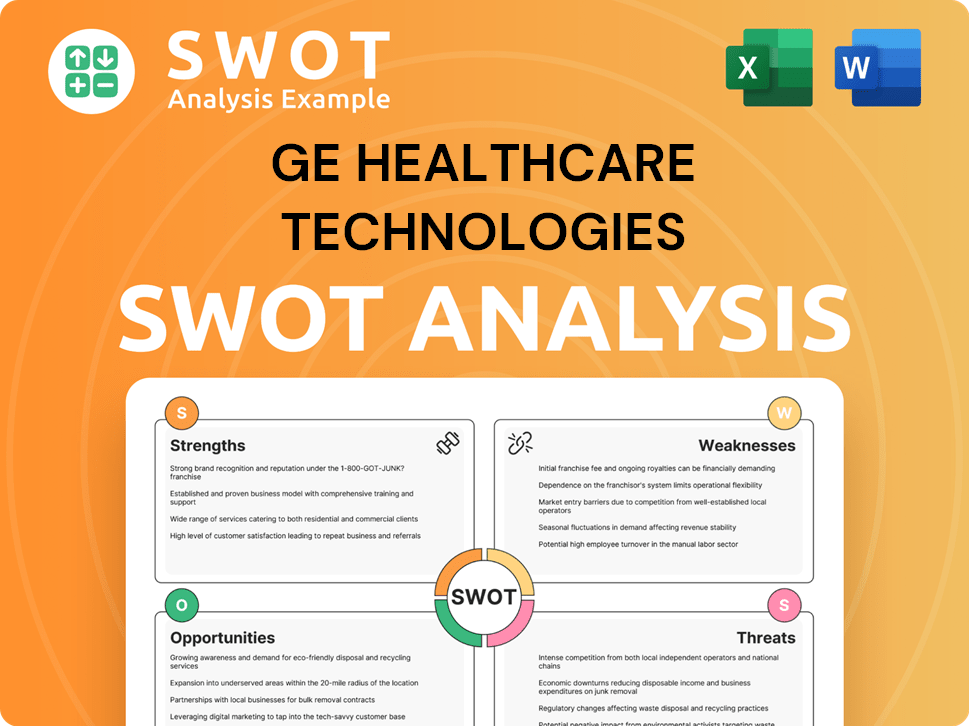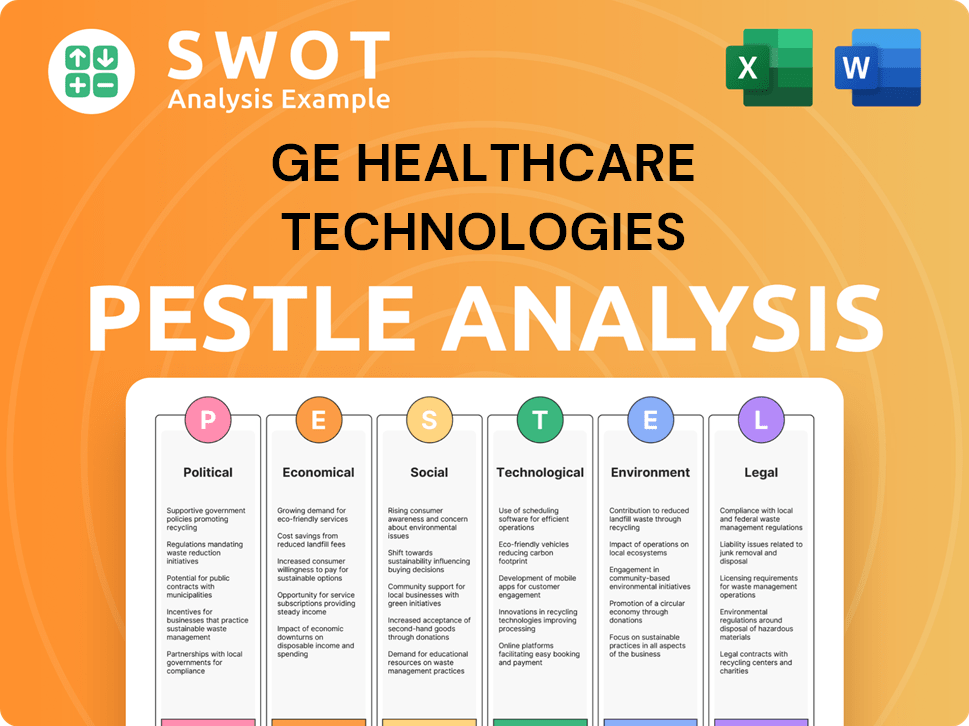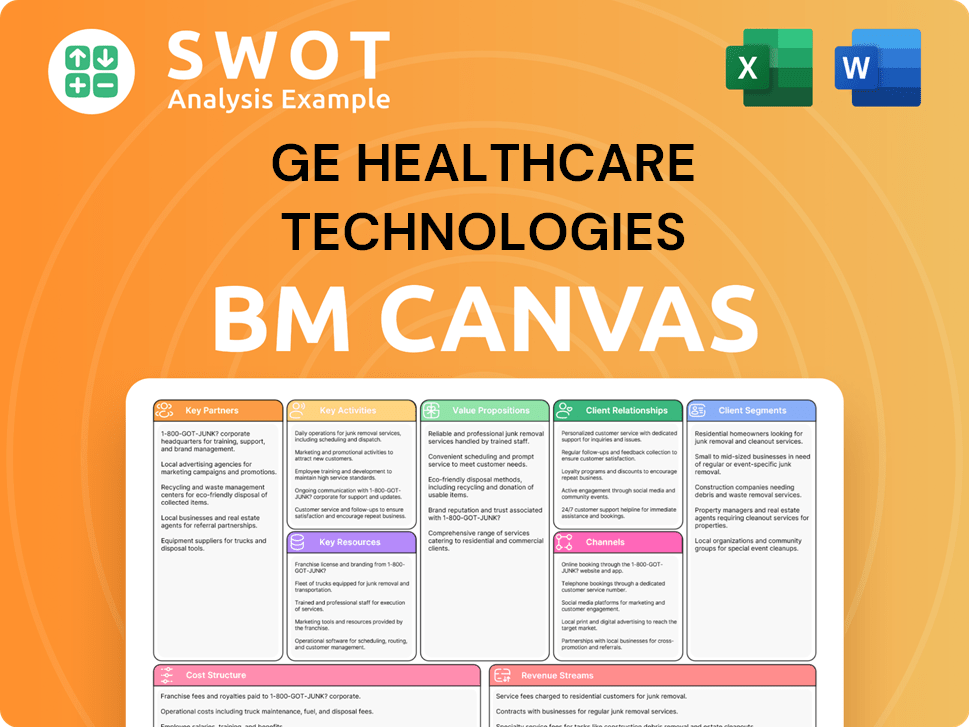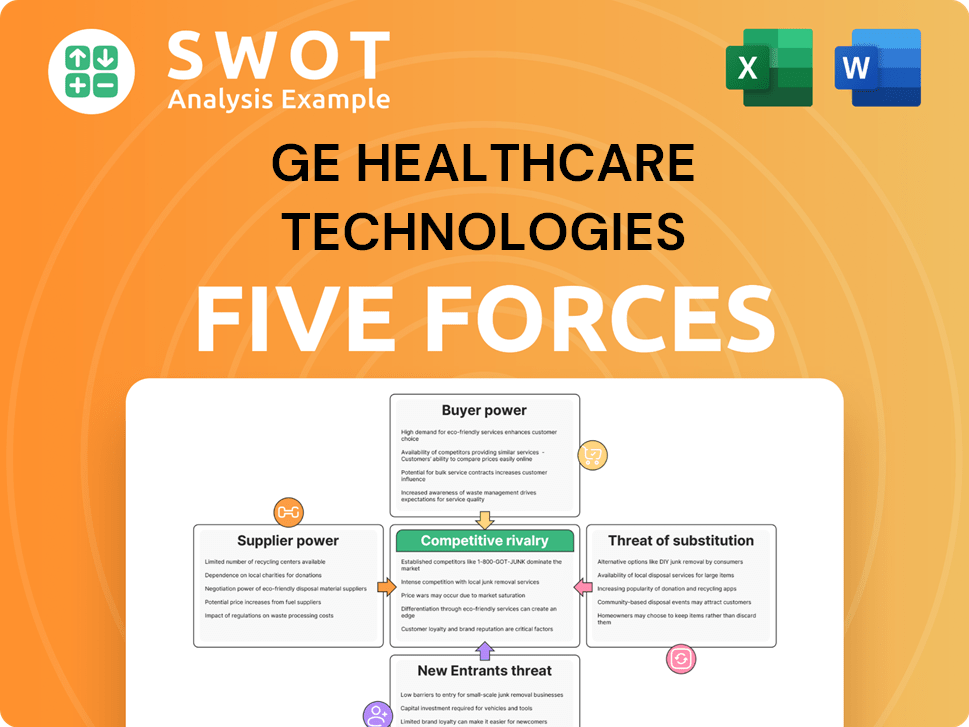GE HealthCare Technologies Bundle
Who Really Owns GE HealthCare?
Unraveling the ownership structure of a healthcare giant like GE HealthCare is crucial for understanding its strategic direction and future prospects. The spin-off from General Electric marked a pivotal moment, transforming a division into an independent, publicly traded GE HealthCare Technologies SWOT Analysis company. This shift raises critical questions about control, influence, and the long-term vision for this major player in medical technology.

This exploration will delve into the evolution of GE HealthCare ownership, examining its roots within General Electric and its transformation into a separate entity. We'll uncover the key stakeholders, from institutional investors to individual shareholders, and analyze how their influence shapes the company's trajectory. Understanding who owns GE HealthCare, its stock symbol (GEHC), and its financial performance is key to making informed decisions in the dynamic healthcare market.
Who Founded GE HealthCare Technologies?
The question of 'Who owns GE HealthCare?' is best answered by understanding its origins and subsequent spin-off from General Electric (GE). The healthcare company, now known as GE HealthCare Technologies Inc., emerged from GE, a company with a long history dating back to 1892. Therefore, its ownership structure is closely tied to GE's corporate evolution.
Before its independence, GE HealthCare was a division of GE. In May 2022, GE HealthCare Holding LLC was established to hold GE's healthcare division. The significant shift in ownership happened on January 4, 2023, when General Electric completed the spin-off, marking GE HealthCare's formal debut as an independent entity.
The spin-off involved GE distributing approximately 80.1% of GE HealthCare's common stock to its shareholders. GE retained around 19.9% of the outstanding shares immediately after the distribution, holding 90,331,302 shares. This structure highlights the transition from being a GE division to an independent, publicly traded healthcare company.
GE HealthCare's early financial backing came from General Electric's resources. GE Ventures, GE's venture capital arm, invested in healthcare startups, but these were external investments rather than direct equity in GE HealthCare itself. The spin-off's equity split was primarily determined by the distribution to GE shareholders and GE's retained stake. The separation was a strategic move by GE to create three independent public companies.
- The company's leadership, including CEO Peter Arduini and Chairman H. Lawrence Culp Jr., focused on 'Precision Care' and value creation.
- The spin-off aimed to unlock value and provide strategic focus for GE HealthCare as a standalone entity.
- Post-spin-off, GE HealthCare began trading on the Nasdaq under the symbol 'GEHC'.
- For more insights into the company's strategic positioning, consider exploring the Target Market of GE HealthCare Technologies.
GE HealthCare Technologies SWOT Analysis
- Complete SWOT Breakdown
- Fully Customizable
- Editable in Excel & Word
- Professional Formatting
- Investor-Ready Format

How Has GE HealthCare Technologies’s Ownership Changed Over Time?
The ownership structure of GE HealthCare has fundamentally changed since its spin-off from General Electric. The separation, which effectively launched GE HealthCare as a publicly traded entity, occurred on January 4, 2023. This pivotal moment, marked by the start of trading on Nasdaq under the ticker 'GEHC', established the company's independent status. As of June 11, 2025, the market capitalization of GE HealthCare is approximately $33.87 billion, a testament to its position as a standalone healthcare company.
Following the spin-off, General Electric initially held a 19.9% stake. However, the ownership landscape quickly evolved, with institutional investors becoming the predominant shareholders. This shift reflects the transition from being part of a larger conglomerate to operating as an independent public entity, attracting a diverse base of institutional investments. The strategic direction of GE HealthCare is now independently determined, focusing on precision care and leveraging its core business segments.
| Key Event | Date | Impact on Ownership |
|---|---|---|
| Spin-off from General Electric | January 4, 2023 | Established GE HealthCare as a publicly traded company; Initial ownership by General Electric. |
| Institutional Investment Growth | Ongoing (post-January 2023) | Increased institutional ownership, indicating a shift towards long-term value creation. |
| Shareholder Base Diversification | Ongoing | Attraction of a broad base of institutional investors, including major investment firms. |
As of May 2025, institutional investors hold approximately 88.4% of GE HealthCare's stock. Major institutional shareholders include Vanguard Group Inc. (holding 11.24%), Capital Research Global Investors (holding 11.2%), and BlackRock, Inc. Other significant holders include State Street Corp, Dodge & Cox, and Invesco Ltd. Individual insiders hold a minimal percentage, about 0.22% as of May 2025. Retail investors and public companies hold the remaining shares. This demonstrates a significant change in GE HealthCare's ownership, reflecting its evolution as a standalone healthcare company.
GE HealthCare's ownership structure has transformed significantly since its spin-off from General Electric.
- The company is now primarily owned by institutional investors.
- General Electric initially held a significant stake but has since reduced its holdings.
- The shift reflects a move towards long-term value creation and stable governance.
- The company's strategic direction is now independently determined.
GE HealthCare Technologies PESTLE Analysis
- Covers All 6 PESTLE Categories
- No Research Needed – Save Hours of Work
- Built by Experts, Trusted by Consultants
- Instant Download, Ready to Use
- 100% Editable, Fully Customizable

Who Sits on GE HealthCare Technologies’s Board?
The current Board of Directors of GE HealthCare Technologies plays a vital role in its governance and strategic direction. As of March 31, 2025, the Board comprises ten director nominees, each elected for a one-year term. H. Lawrence Culp Jr., formerly the Chairman and CEO of General Electric during the spin-off, serves as the non-executive Chairman of GE HealthCare's Board. Other board members bring diverse experience from technology, healthcare, and finance sectors. While specific board members representing major institutional shareholders are not always detailed in public information, the presence of large institutional investors often influences board composition over time.
The composition of the board reflects a commitment to sound governance practices. The board's structure helps ensure that the company is managed effectively and in the best interests of its shareholders. The board's oversight is crucial for maintaining the company's financial health and strategic direction. The board's decisions have a direct impact on the company's performance and its ability to achieve its long-term goals. The board's role is essential for fostering a culture of accountability and transparency within the company.
| Board Member | Title | Background |
|---|---|---|
| H. Lawrence Culp Jr. | Chairman of the Board | Former Chairman and CEO of General Electric |
| Name withheld for privacy | Director | Experience in Technology |
| Name withheld for privacy | Director | Experience in Healthcare |
| Name withheld for privacy | Director | Experience in Finance |
GE HealthCare's voting structure operates on a one-share-one-vote principle for its common stock. Each common stock holder is entitled to one vote per share on all matters submitted to a stockholder vote. The company's certificate of incorporation does not provide for cumulative voting rights, and there are no publicly disclosed special voting rights or founder shares. Vacancies on the Board are filled by a majority vote of the remaining directors. As of April 2025, there have been no significant proxy battles or activist investor campaigns publicly reported that have dramatically reshaped decision-making within the company since its spin-off. The company focuses on long-term value and operational efficiency, aligning with its shareholder base's interests.
The Board of Directors oversees the strategic direction of GE HealthCare. The voting structure is straightforward, with one vote per share. The company's governance emphasizes long-term value creation.
- The Board consists of ten director nominees.
- H. Lawrence Culp Jr. serves as the non-executive Chairman.
- Voting is based on a one-share-one-vote system.
- Focus on long-term value and operational efficiency.
GE HealthCare Technologies Business Model Canvas
- Complete 9-Block Business Model Canvas
- Effortlessly Communicate Your Business Strategy
- Investor-Ready BMC Format
- 100% Editable and Customizable
- Clear and Structured Layout

What Recent Changes Have Shaped GE HealthCare Technologies’s Ownership Landscape?
Over the past few years, the ownership structure of GE HealthCare has evolved significantly, primarily due to its spin-off from General Electric. This transition, which concluded on January 4, 2023, marked a pivotal moment, transforming the company into an independent public entity. GE initially retained a significant stake, but subsequent secondary offerings have gradually reduced its ownership as part of a broader strategy to divest non-core businesses. SEC filings from March and September 2024 indicate secondary offerings of 14,000,000 and 15,000,000 shares, respectively, reflecting ongoing adjustments in the ownership landscape.
Current trends highlight a strong presence of institutional investors in GE HealthCare. As of November 2024, institutional investors held approximately 88.4% of the company's stock. This high level of institutional ownership is typical within the medical technology sector, where large funds often favor established, publicly traded companies. Major institutional shareholders, including Vanguard Group Inc., Capital Research Global Investors, and BlackRock, Inc., continue to hold substantial positions. For example, Vanguard held 11.24% and Capital Research Global Investors held 11.2% as of March 31, 2025. While institutional holdings saw a slight decrease of 2.6458% in May 2025, this is part of the normal fluctuation of institutional investment.
| Key Developments | Date | Details |
|---|---|---|
| Spin-off from General Electric | January 4, 2023 | Became an independent public company. |
| Acquisition of Caption Health | February 2023 | Acquired for $150 million. |
| Acquisition of clinical AI business from Intelligent Ultrasound | July 2024 | Acquired for $51 million. |
| Acquisition of Nihon Medi-Physics (NMP) | March 2025 | Acquired the remaining 50% stake, giving full ownership. |
GE HealthCare has been actively expanding its portfolio through strategic acquisitions. In February 2023, it acquired Caption Health for $150 million, focusing on AI medical technology. Further acquisitions include the clinical artificial intelligence business from Intelligent Ultrasound in July 2024 for $51 million. A significant move was the acquisition of the remaining 50% stake in Nihon Medi-Physics (NMP) in March 2025, a leading radiopharmaceutical company in Japan, which strengthens its pharmaceutical diagnostics segment. For more insights into the company's financial performance and business model, consider reading Revenue Streams & Business Model of GE HealthCare Technologies.
GE HealthCare is primarily owned by institutional investors. Major shareholders include The Vanguard Group and Capital Research Global Investors, with substantial stakes in the company.
Yes, GE HealthCare is a publicly traded company. Its stock symbol is GEHC.
GE HealthCare became an independent public company on January 4, 2023, following its spin-off from General Electric.
The outlook for 2025 is positive, with projected organic revenue growth of 2% to 3% and adjusted EPS in the range of $4.61 to $4.75.
GE HealthCare Technologies Porter's Five Forces Analysis
- Covers All 5 Competitive Forces in Detail
- Structured for Consultants, Students, and Founders
- 100% Editable in Microsoft Word & Excel
- Instant Digital Download – Use Immediately
- Compatible with Mac & PC – Fully Unlocked

Related Blogs
- What are Mission Vision & Core Values of GE HealthCare Technologies Company?
- What is Competitive Landscape of GE HealthCare Technologies Company?
- What is Growth Strategy and Future Prospects of GE HealthCare Technologies Company?
- How Does GE HealthCare Technologies Company Work?
- What is Sales and Marketing Strategy of GE HealthCare Technologies Company?
- What is Brief History of GE HealthCare Technologies Company?
- What is Customer Demographics and Target Market of GE HealthCare Technologies Company?
Disclaimer
All information, articles, and product details provided on this website are for general informational and educational purposes only. We do not claim any ownership over, nor do we intend to infringe upon, any trademarks, copyrights, logos, brand names, or other intellectual property mentioned or depicted on this site. Such intellectual property remains the property of its respective owners, and any references here are made solely for identification or informational purposes, without implying any affiliation, endorsement, or partnership.
We make no representations or warranties, express or implied, regarding the accuracy, completeness, or suitability of any content or products presented. Nothing on this website should be construed as legal, tax, investment, financial, medical, or other professional advice. In addition, no part of this site—including articles or product references—constitutes a solicitation, recommendation, endorsement, advertisement, or offer to buy or sell any securities, franchises, or other financial instruments, particularly in jurisdictions where such activity would be unlawful.
All content is of a general nature and may not address the specific circumstances of any individual or entity. It is not a substitute for professional advice or services. Any actions you take based on the information provided here are strictly at your own risk. You accept full responsibility for any decisions or outcomes arising from your use of this website and agree to release us from any liability in connection with your use of, or reliance upon, the content or products found herein.